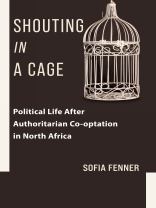Durable authoritarian rule often rests on the co-optation of challengers. The conventional story is straightforward: rulers entice opposition groups to “sell out, ” offering them benefits if they set aside their antiauthoritarian aspirations and become part of the system. However, co-optation does not always neutralize former adversaries, and even seemingly domesticated opponents can turn on their rulers. Co-optation does weaken opposition—but it is not as simple, reliable, or transactional as existing theories claim.
Shouting in a Cage offers new ways to understand co-optation’s power and its limits by examining two co-opted parties, the Wafd Party in Egypt and the Istiqlal Party in Morocco. Sofia Fenner argues that co-optation is less a corrupt bargain than a discursive contest—a clash of competing interpretations. Co-opted parties conjure up imagined futures in which their short-term choices will lead to the realization of their long-term democratic goals. Meanwhile, other actors point to the disconnect between these parties’ antiauthoritarian aspirations and their participation in authoritarian systems. Fenner demonstrates that co-opted parties come to look hypocritical precisely because they refuse to give up their oppositional commitments. Their credibility sapped, they become unappealing allies and, eventually, political afterthoughts. However, such parties retain a surprising capacity for opposition, rooted in the literal and metaphorical idea of “party as family.” Based on extensive archival research and ethnographic fieldwork in North Africa, Shouting in a Cage broadens our understanding of political behavior under authoritarianism.
Mục lục
Acknowledgments
Note on Transliterations, Names, and Titles
Introduction
Part I. Co-optation in History and Theory
1. The Wafd and the Istiqlal
2. Conceptualizing Co-optation
Part II. A Changed Life: How Co-optation Neutralizes Opposition
3. Co-optation as Interpretative Dilemma: Istiqlal’s Democratic Journey
4. Co-optation as Interpretive Dilemma: The Wafd at War
Part III. Life Goes On: How Co-opted Opposition Survives
5. Party-as-Family
6. Generation After Generation: Making Sense of Confrontational Turns
Conclusion: Authoritarianism as Tragedy
Notes
Bibliography
Index
Giới thiệu về tác giả
Sofia Fenner is assistant professor of political science at Colorado College. She is a coauthor of
Coercive Distribution (2018).












